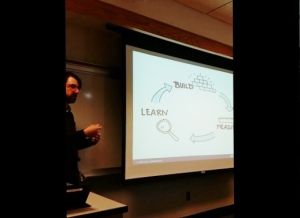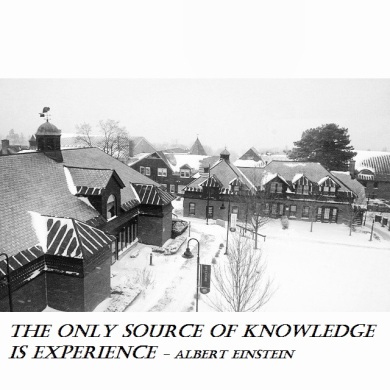
Gender stereotyping has been an ethical controversy as it is inevitably linked with marketing. As it can be seen as a method to focus onto the target market and its specific segments, its implications are detrimental. Nowadays, everyone has experienced the impact of advertising, some more than others. Yet, marketers also have a lot of social power over perpetuating and challenging stereotypes. This paper will explore the female gender stereotyping in today’s marketing through case studies, using utilitarianism, deontology or virtue ethics, its implications and the changes in marketing trends to reverse negative stereotypes.
Case Study 1: Nine West


The first case study is about the brand Nine West, which mostly produces shoes. Its recent marketing campaign in 2014 was widely criticized by consumers and the media. With their slogans such as “Husband Hunting,” “Walk of Shame,” and “Drunch,” which implies drunk lunch, the campaign suggests that women are single mindedly oriented on the dependency of a male significant other, are to be shamed when there is an interaction with that man, and are so bored that a weekly brunch turns into a drinking session. Meanwhile, the campaign is missing the fact that today’s women are hunting for success, goals, dreams and visions – not husbands.
From a deontological perspective, considering the ethics of freedom and dignity, this campaign was working against fostering, preserving and respecting the fundamental humanity. In contrary, its marketing suggests that women now think they have a very specific, and outdated social role to step into (no pun intended), choose to go husband hunting and act to buy shoes for this occasion.
Personally, I agree with the deontological perspective. The Nine West strategy is outdated and its implications are single minded. As if women only buy a new pair of designer shoes in occasions such as hunting for a man or taking the children to school. It’s upsetting that Nine West thinks it’s alright to assume every woman thinks one dimensional. I think that the strategy could have been successful, if the occasions of buying new shoes were along the lines of “New day as CEO,” “Walk of Pride” or “Gaining Independence.”
Case Study 2: Victoria’s Secret
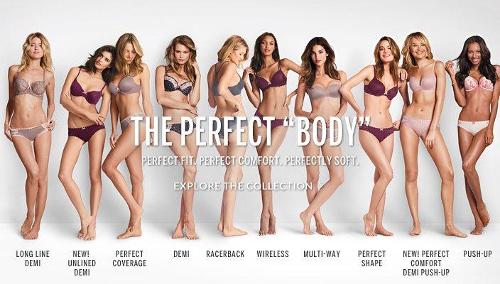
The lingerie company’s latest marketing campaign for their product called “Body by Victoria,” shows 10 thin models with the slogan written over them “The Perfect ‘Body.’” As these three words in combination with women that represent a body type that less than 5% of the female population has and can healthily obtain, promotes negative body image. Having a negative body image together with a pressure of obtaining “the perfect body” can lead to much more and detrimental implications. This can lead to eating disorders of all kinds, self-esteem issues, and insecurity.
As this is a topic that personally reaches me, I have a strong opinion about this specific campaign. I agree with the 10,000 signatures of a petition against the campaign, that this is causing more harm than good to any woman at any age. After this petition that started in the UK has reach a global wide trending issue, the company quickly changed its slogan to “A Body for Every Body.” Strangely enough, the slogan of their 2012 campaign was “I love my body.” Within two years Victoria’s Secret went from empowerment to destruction of a healthy body image.

The utilitarianism perspective focuses its measure of right or wrong on the greatest happiness of the greatest number of people. I agree in aspect to “The Perfect ‘Body’” campaign, that Victoria’s secret has harmed the greatest number of women. By displaying women with a body type that only 5% of the female population has, it promotes something unachievable for the rest 95% of us. I also think that the concept of negative body image has gone beyond just displaying an unattainable goal. It is now a deeply imbedded issue, it is suggesting that we women ought to have a certain type of body, no matter what the rest of the human being may be, think or do.
Case Study 3: Always

Always recent marketing campaign #LikeaGirl from 2014/2015 is not focused on the product, but their target audience, women who have been influenced my advertisements and society to think their body and entire potential is minimal. The advertisement states “You are incredible. You are unstoppable. And you do thinks #LikeaGirl” to change the meaning of “like a girl” from an insult into something positive and amazing. Especially inspiring was the Superbowl commercial that portrayed different ages of women and girls who were asked to do something “like a girl”. As the older young women would do these actions exaggerated, ditsy and almost embarrassingly humiliating, the younger girls would do thinks “like a girl” by doing them as best as they could, whether that is running fast, throwing far or fighting hard. This emphasizes Always’ question “When did doing something ‘like a girl’ become an insult?”


From a virtue ethics perspective, everyone, including companies come to a point where they have to choose between the right way and easy way. Always chose the right way, as they are no longer promoting their product to make profit, but supported self-acceptance and pride to reach their target market, Women. The results showed that 76% of girls’ ages 16-24 no longer see the phrase “like a girl” as an insult and two out of three men who watched the commercial said they would stop or think twice before using “like a girl” like an insult.
At this point, I would personally say that marketing doesn’t necessarily have a special obligation to challenge or undermine stereotypes, however, in my opinion they would be more successful. In the end it is not about what the commercial said, or what the product does, but how the brand makes the customer feel that creates a connection between the company and their target markets. And as a young female professional, I already strongly associate myself with those brands that do challenge female gender stereotyping.
My personal opinion
As I sometimes feel like a victim of negative gender stereotyping, I would like to take this moment to discuss my opinion about the creation of campaigns that miscommunicate their intentions. It’s important to note that there just isn’t one definition of the female body. In respects of the campaigns, Nine West and Victoria’s Secret, I speculate who made these advertisements and to whom they actually were tailored to. If it is a case that the campaigns were designed by the opposite sex, and without additional support by the female marketers, miscommunication is inevitable.
There has always been a miscommunication between the genders about perceptions of the complex issue of body image. In regards to communication, I’d like to take the liberty to assume that many men might feel women don’t tell them directly enough if they are doing something wrong, and many women feel that men don’t tell them directly enough if they are doing well. This means that not only is our perception of each other off balance, but so is our communication. Men and women simply have different styles of communicating, different languages almost. So if the true goal was not just self-expression but communications, then it’s not enough for language to be right; it has to be shared, or at least understood.

But let’s assume that for this paper we all are after self-expression? How can you successfully express yourself, if your perception of yourself is altered by how others look at you? As an inspiration to this ethical controversy, I took a look at Jean Kilbourne’s documentary of “Killing Us Softly,” where she explained how the media has altered how we look at ourselves and how my own way of looking at myself isn’t really mine. The media has influenced me by comparing myself and my body not only to women that represent less than 5% of the population, but to bodies that through Photoshop don’t even exist in reality.
So how can this bring any happiness to the 95% excluded women when we all see over 3,000 ads per day? Some companies have already taken a step into changing the direction of marketing campaigns, such as Dove’s campaign for “Real Beauty” and Always “Like a Girl” campaign.
Personally, the recent Always campaign has impacted me the most, as it inspired me to change the phrase “like a girl” from an offence to a praise. It promotes the exact opposite as the Victoria’s Secret campaign, and goes beyond their profit. It is ethically right to take the courage and address issues that aren’t easy to solve, such as gender stereotyping. Changing not only society’s perspective of women’s roles, but the language and our ways of communicating with each other, is difficult. Always definitely took a risk with this campaign. However, I think it’s refreshing and encouraging to finally see someone take a nationwide stance on the imperfections of our society. Especially the United States likes to think their improvements on equality are above and beyond global status, it isn’t perfect. I am happy to see the trends reverting to something more relatable to find confidence in one self.

 Another speech I had the honor to give at the Board of Trustees Dinner with the Champlain College Class of 2015, Alumni and Faculty and Staff. Here is what I learned from my 4 years studying at Champlain:
Another speech I had the honor to give at the Board of Trustees Dinner with the Champlain College Class of 2015, Alumni and Faculty and Staff. Here is what I learned from my 4 years studying at Champlain:
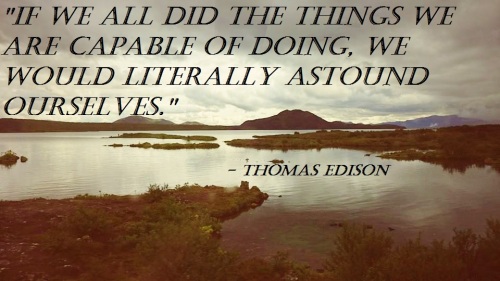
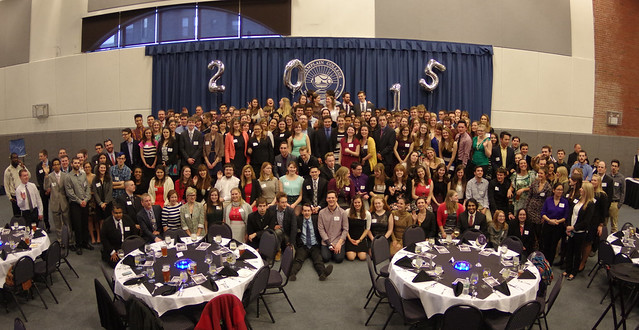











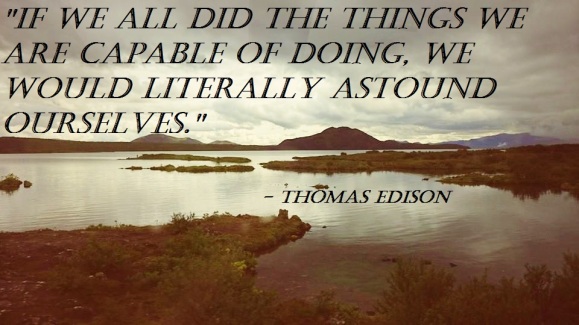


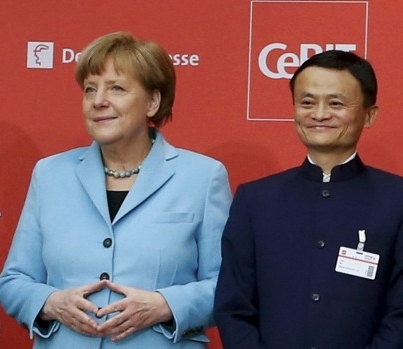

![Easy Weeknight Meals - As you walk into your #apartment after a long day at the office, the last thing you probably want to do is cook #dinner. While there’s no shame in popping a frozen pizza in the oven every now and then, you can prepare easy weeknight #meals–even if you’re on a budget (and we don’t mean heating up another packet of ramen noodles). Try these quick healthy recipes to give your microwave a break and increase the deliciousness-factor of your evening meal. [Rent.com Blog]](https://s-media-cache-ak0.pinimg.com/736x/bd/e0/05/bde00507e37d1e0c85504090764eeae7.jpg)








 Recently we had a speaker in our capstone class at Champlain College, introducing us to the big deal of big data. Meet
Recently we had a speaker in our capstone class at Champlain College, introducing us to the big deal of big data. Meet 